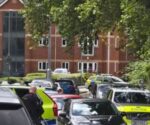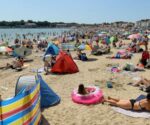The pretty UK seaside town that’s one of the most ‘radioactive places’ | UK | News
Just nine miles from Edinburgh sits a beautiful coastal town that has an amazing beaches, however it has a weird history of being the most “radioactive” town in the UK.
Developed in 1962 Dalgety Bay is a fairly new small coastal town in Fife, located on the coast between Inverkeithing and Aberdour.
With a blended mix of modern and older style housing there is always a demand for flats as many people travel to and from Edinburgh to Dalgety Bay.
The Scottish town also has a railway station for trains to Edinburgh, Kirkcaldy, Inverkeithing and Perth. There is also a regular bus network giving easy access to visitors.
There are a number of historically important buildings including St Bridget’s, a distinctive former parish church, as well as several notable towers and mansions.
However, the town has an interesting history. The coastline of Dalgety Bay was contaminated with radioactive material from scrapped World War Two aircraft. This meant that people were banned from accessing the bay between 2011 and 2023.
The town used to be a base for the Royal Air Force and was the site of a major aircraft repair yard. Much of the industrial estate on the north of the town is built on the runway of the airfield.
Overall, it is estimated that more than 12,000 radioactive particles have been removed from the Dalgety Bay coastline since 1990.
The particles were first discovered during routine monitoring, they pose a low risk to public health.
The radioactive particles were first discovered during routine monitoring, they pose a low risk to public health.
Scottish Environment Protection Agency (Sepa) began the clean-up in 2020 but was hit by delays and it began the following year. The largest particles was contained within the headland at Dalgety Bay Sailing Club.
To remove all the hazardous material, a team of engineers sifted through tonnes of sand and soil from the whole beach. Work was paused between October and April each year to protect overwintering birds.
The project was last reported to have cost £10.5m.








